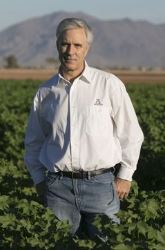
Peter C. Ellsworth was raised in Longmeadow, Massachusetts, received degrees in entomology from the University of New Hampshire, the University of Missouri, and North Carolina State University and is an IPM Specialist & Professor at the University of Arizona. He established the Arizona Pest Management Center in 2003 as a multi-disciplinary consortium of pest management scientists focused on research, outreach and implementation of IPM in Arizona, which in 2012 was awarded the US-EPA’s PESP Gold Tier Shining Star award. He serves as Director of the APMC, State IPM Coordinator, State Pesticide Coordinator and co-Director of the Western IPM Center. Dr. Ellsworth develops science-based solutions for integrated pest management through applied ecological investigations and organized outreach programs of Cooperative Extension, with principal focus on the cotton agroecosystem. He has special interests in the integration of chemical and biological controls, and landscape processes that control pest and beneficial insect distributions. He is located at the University of Arizona’s largest experiment station, the Maricopa Agricultural Center in Maricopa, AZ, a 2100-acre laboratory, research and demonstration farm complex. Dr. Ellsworth has studied the management of whiteflies for over 23 years and authored the successful US-EPA Section 18 Emergency Exemption that made two strategic insect growth regulators, pyriproxyfen and buprofezin, available to Arizona cotton growers for the control of whiteflies in 1996. Together with many other cotton pest management advances, it is estimated that the cotton industry saved over $388,000,000 since that time through 2011 by practicing the IPM programs that Dr. Ellsworth helped to develop. He has assisted producers in the development and deployment of whitefly and other cotton IPM programs in Australia, Brazil, and Mexico. Together with Dr. John Palumbo (Univ. of Ariz.) and many others, he has helped implement innovative cross-commodity whitefly management programs that have helped producers of cotton, melons and vegetables stabilize their IPM systems in Arizona.
Peter C. Ellsworth was raised in Longmeadow, Massachusetts, received degrees in entomology from the University of New Hampshire, the University of Missouri, and North Carolina State University and is an IPM Specialist & Professor at the University of Arizona. He established the Arizona Pest Management Center in 2003 as a multi-disciplinary consortium of pest management scientists focused on research, outreach and implementation of IPM in Arizona, which in 2012 was awarded the US-EPA’s PESP Gold Tier Shining Star award. He serves as Director of the APMC, State IPM Coordinator, State Pesticide Coordinator and co-Director of the Western IPM Center. Dr. Ellsworth develops science-based solutions for integrated pest management through applied ecological investigations and organized outreach programs of Cooperative Extension, with principal focus on the cotton agroecosystem. He has special interests in the integration of chemical and biological controls, and landscape processes that control pest and beneficial insect distributions. He is located at the University of Arizona’s largest experiment station, the Maricopa Agricultural Center in Maricopa, AZ, a 2100-acre laboratory, research and demonstration farm complex. Dr. Ellsworth has studied the management of whiteflies for over 23 years and authored the successful US-EPA Section 18 Emergency Exemption that made two strategic insect growth regulators, pyriproxyfen and buprofezin, available to Arizona cotton growers for the control of whiteflies in 1996. Together with many other cotton pest management advances, it is estimated that the cotton industry saved over $388,000,000 since that time through 2011 by practicing the IPM programs that Dr. Ellsworth helped to develop. He has assisted producers in the development and deployment of whitefly and other cotton IPM programs in Australia, Brazil, and Mexico. Together with Dr. John Palumbo (Univ. of Ariz.) and many others, he has helped implement innovative cross-commodity whitefly management programs that have helped producers of cotton, melons and vegetables stabilize their IPM systems in Arizona.
